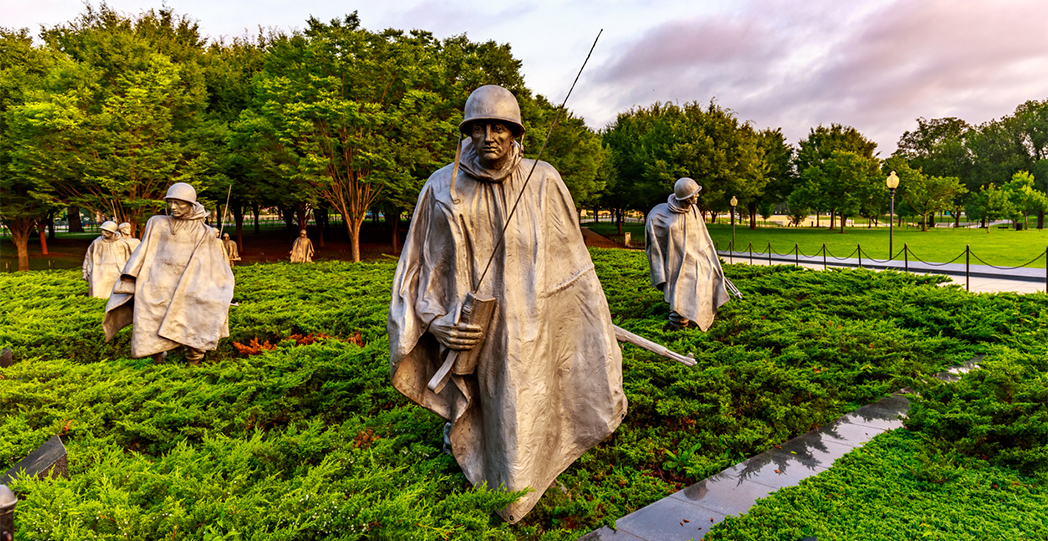It’s been 50 years since the Korean War Armistice marked the end of what many call the “forgotten war.” Signed on July 27, 1953, the armistice ended three years of fighting in Korea.
The Korean War earned the nickname the “forgotten war” because of its lack of support at home and minimal news coverage. But nearly 2 million American soldiers who served in Korea during that brutal war never forgot their experiences. Korean War Veterans Armistice Day is now recognized every year on July 27, honoring those who fought and died to keep South Korea free from communism.
In recognition of this day, we take a look back at the Korean War and what led to the longest negotiated armistice in history.
Fear of communism
When World War II ended in 1945, it offered a sense of peace and prosperity to Americans. However, the government was growing concerned about the potential spread of communism from the Soviet Union.
After WWII, Korea was split in half along the 38th parallel between a Soviet-backed government in the north and an American-backed government in the south. On June 25, 1950, war broke out along the 38th parallel, with North Korea making several strategic attacks in an attempt to move south toward Seoul. The attacks caught the U.S. by surprise, and for the first two months, North Korea successfully moved ahead.
The United National Security Council unanimously voted that this action was a breach of peace, and President Harry Truman issued a press release that the U.S. was taking action.
“In Korea, the Government Forces, which were armed to prevent border raids and to preserve internal security, were attacked by invading forces from North Korea. The security council of the United States called upon the invading troops to cease hostilities and to withdraw to the 38th parallel. This they have not done, but on the contrary have pressed the attack,” read the press release. “In these circumstances, I have ordered United States air and sea forces to give the Korean government troops cover and support… The attack upon Korea makes it plain beyond all doubt that Communism has passed beyond the use of subversion to conquer independent nations and will now use armed invasion and war.”
Reaction to U.S. involvement
The attack by a Communist state on Korea was exactly what the U.S. government feared—an aggressive push to take over a free nation. Many in the U.S., such as Sen. Joseph McCarthy, felt that Truman was soft on Communism.
Truman had to make a move. But Americans were tired of war, especially one that appeared to drag on with no end in sight. It was a challenging fight and unpopular at home. From home soil, this appeared to be a war lost in the trenches.
Although the U.S. eventually got organized and gained momentum, they were surprised again when China entered the war and pushed them back. This led to two more years of conflict.
Truman’s support sank while the Korean War continued. He soon lost the presidency to popular military hero Gen. Dwight D. Eisenhower.
A long-negotiated armistice
After three years of conflict, the Korean War ended on July 27, 1953. It took 158 meetings and more than two years to negotiate a truce—the longest in history. And after all the fighting, little changed.
The armistice conditions included an end to open hostilities and established Demilitarized Zone that would act as a buffer between the two forces. Neither side was allowed to enter the air, ground, or sea space of the other. And a newly created Military Armistice Commission was created to oversee terms of the truce.
Eisenhower was instrumental in moving the truce forward. He said: “Soldiers, sailors and airmen of 16 different countries have stood as partners beside us throughout these long and bitter months… And so at long last the carnage of war is to cease and the negotiation of the conference table is to begin.... [We hope that] all nations may come to see the wisdom of composing differences in this fashion before, rather than after, there is resort to brutal and futile battle.”
Recognizing Korean War Armistice Day
In 1995 in the National Mall in Washington, D.C., then-President Bill Clinton and South Korea's then-President Kim Young Sam dedicated the Korean War Veterans Memorial. The 19 stainless steel statues representing all branches of the military “on patrol” reminds us that “freedom is not free.” A Wall of Remembrance and Pool of Remembrance provide a quiet place of reflection.
Three years after the memorial was dedicated, U.S. Code Title 36 was amended to annually recognize Korean War Veterans Armistice Day on July 27. On this day, government agencies fly flags at half-staff in honor of all who laid down their lives during the Korean War. Ceremonies are held at Arlington National Cemetery, and Americans are encouraged to commemorate the day.
Americans can honor and remember those who fought during the Korean War by learning more about its history. Simple acts such as thanking a veteran for their service or volunteering with a veteran service organization are also ways to honor and respect veterans of the Korean War.
With a team comprised of many military veterans and military family members, IHG® Army Hotels is grateful to work alongside those who have served and continue to serve. We honor all the men and women who lost their lives and served for freedom.





